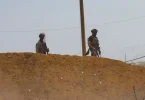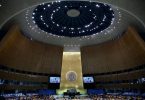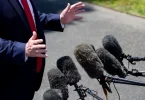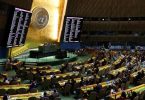Rami G Khouri
Israel’s September 7 drone attack in Doha, Qatar, apparently aimed at killing top Hamas leaders, was not just another strike in a region where Israeli aggression has become routine. The location made it extraordinary: The capital city of the major United States ally mediating the ceasefire talks between Israel and Hamas. Yet in its intent and effect, the attack echoed Israel’s familiar pattern of using assassinations and military force to derail negotiations and block any path to peaceful coexistence.
Israel has long disregarded international law, struck targets across the region, assassinated Palestinian and other leaders who resist it, and collapsed ceasefire or peace negotiations with its Palestinian foes, always in the name of protecting its security. In 1948, members of the Israeli Stern Gang assassinated the first UN mediator, Count Folke Bernadotte. Since then, Israel has killed dozens of Palestinian, Lebanese, and other leaders who opposed its occupation, apartheid policies, and military aggression – but rather than weakening its enemies, such assassinations have only strengthened resistance to Israel’s rule and actions.
The Doha attack is a continuation of this history. Over the past 22 months, Israel has aborted every serious discussion of a ceasefire, sometimes after securing the release of its citizens held by Hamas or Islamic Jihad, while continuing to starve Palestinians in Gaza and dismantle their society. By striking Hamas leaders in the very country mediating the negotiations, Israel has underlined that it is not interested in peace, only in the capitulation of its foes.
This raises an intriguing question: Why did Israel choose to carry out such an operation in Qatar, which not only mediates the negotiations but also hosts the US Central Command military base – the largest in the region?
How Qatar and its GCC partners react could reshape relations with Washington for years, especially if it emerges that the US knew about the attack or even facilitated it – by pretending that serious ceasefire talks were under way that required the Hamas leadership to gather, thereby making them an easy target.
Such a scenario would mirror the US role in the joint Israeli and US attack on Iran earlier this year, which took place even as Donald Trump spoke of progress towards a deal with Tehran – while preparing to attack it.
Perhaps the most significant consequence of the attack will be its effect on Israeli-US relations and on the standing of the US in the region and beyond.
Virtually the entire world has denounced the attack, including the GCC and Arab League states, as well as Iran, the UN, many Europeans, and even the pope. President Donald Trump also offered mild criticism, while still backing Israel’s goal of destroying Hamas. Israel, however, routinely dismisses such condemnations of its aggressive militarism in Lebanon, Syria, Iraq, Yemen, and Iran, making them largely meaningless, with one exception.
If Washington were eventually to conclude that Israel’s militarism had become a strategic burden, or a drag on Republican election victories in the coming years, Trump could compel Israel to end its war in Gaza and accept a long-term truce. He remains the only figure in the world with the power to force a change in Israeli policy, as he demonstrated upon taking office in January, when he pushed Israel to accept the initial ceasefire and prisoner exchange with Hamas. But so far, he has shown no sign that he believes pressuring Israel to end its militarism would serve either his interests or those of the US.
This is why the response to the attack by Qatar, the GCC, and the Arab League states is so vital and must be watched closely, because, in theory, it could create a new dynamic in the region. If Arab leaders conclude that they cannot trust the US to safeguard their interests and security, they could move to join a broader global coalition to rein in Israel’s US-enabled militarism, while also reasserting that international law, treaties, and UN conventions must be applied to protect weaker states from stronger aggressors.
There are no signs of such a shift for now, but one indication of how US policy might evolve came late on Tuesday, when Trump instructed his secretary of state to complete the defence cooperation agreement with Qatar, after “promising” the Emir that Israel would never attack Qatar again. If Washington wants to deepen its defence relations and expand arms sales to Arab partners, it will have to make its promises of protection credible.
Qatar’s response to the Israeli attack could also determine whether the US and Israeli “Abraham Accords” between Israel and four Arab states expand to include others. The UAE last week warned Israel that if it annexed large parts of the West Bank, it would freeze or withdraw from its normalisation of ties under the Abraham Accords. How Washington handles intensifying Israeli attacks against Arab states, including close partners like Qatar, could therefore shape the future of US and GCC relations, which Trump signalled early in his term that he wanted to expand significantly.
Courtesy: aljazeera







